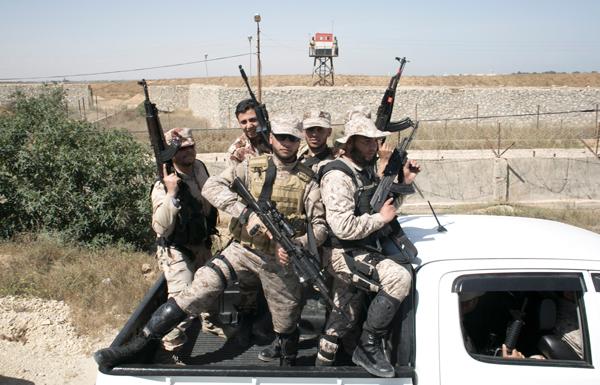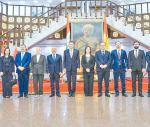You are here
Hamas boosts Gaza border force to ease rift with Egypt
By AFP - Apr 23,2016 - Last updated at Apr 23,2016

Members of the Palestinian Islamist movement Hamas' security forces patrol an area along the border between the Gaza Strip and Egypt, where Hamas began increasing its forces, on Thursday, in Rafah, in the southern Gaza Strip (AFP photo)
GAZA CITY, Palestinian Territories — As peace offerings go, prefabricated metal huts on a sand dune may seem unimpressive, but they are what the Islamist Palestinian movement Hamas, which runs the Gaza Strip, has chosen.
Hamas has set up dozens of new border posts and military checkpoints along the enclave's border with Egypt in an attempt to improve relations with Cairo after three years of acrimony.
The move will be seen as the latest attempt to improve relations with Cairo that have been strained since the overthrow of Egypt's Islamist president Mohammed Morsi in 2013.
Cairo regularly accuses Hamas, which is allied with Morsi's Muslim Brotherhood, of supporting militant attacks inside Egypt.
Morsi was a close Hamas ally, and the army chief who toppled him, Abdel Fattah Al Sisi, is now Egypt's president.
Cairo has largely closed off the border, and Egyptian forces have also destroyed hundreds of Palestinian tunnels used to smuggle commercial goods, cash, people and, allegedly, weapons in both directions.
Now the Hamas-run National Security Force in Gaza has deployed an additional 600 soldiers along its 13-kilometre southern border to bolster security.
And where that frontier adjoins the border with Israel, Hamas has for the first time established three checkpoints within a few hundred metres of Israeli lookout towers.
On a tour of some of the new sites, officials cited their wish to rebuild relations with Cairo and ensure security along their border as the reasons for the developments.
Israel monitoring 'closely'
"We have established 60 bases and military points along our borders with our brothers in Egypt to control the border and to ensure against any penetration," Major General Hussein Abu Aazara told AFP during the tour.
"At the behest of our Egyptian brothers, we have increased the number of troops to 800 from about 200," he said.
He said three bases had been established close to the Kerem Shalom border crossing with Israel.
The Israeli forces said it was "closely watching the developments in Gaza and Hamas's recent activities, including the addition of outposts along the fence".
Addressing hundreds of troops, Hamas official Tawfiq Abu Naim told them that Egypt's security was Hamas' security.
Egyptian soldiers watched from observation towers as Hamas installed the trailers on the dunes along the desert border.
Khaled Al Batsh, a leader in the Islamic Jihad movement in the Palestinian territory, said his group was also committed to Egypt's security.
"The factions reject any interference in Egyptian affairs -- our project is resistance to occupation and the freedom of our nation," he said.
Gaza, wedged between Israel and Egypt's vast Sinai desert, has little access to the outside world as political disputes mean its borders are largely sealed.
Israel has maintained a blockade of Gaza since 2006, and recently banned the supply of cement and construction materials for the private sector, citing security concerns.
'Shift in policy'
Hamas initially refused to accept Egypt's Sisi, accusing him of carrying out a coup against Morsi, but Mukhaimer Abu Sada, professor of political science at Gaza's Al Azhar University, said there had been a "shift in policy" in recent weeks.
A delegation headed by Hamas political bureau member Mussa Abu Marzouk held talks in Egypt last month aimed at normalising relations.
"Hamas and Egypt have agreed to look to the future and try to forget about the past," Abu Sada said.
"Hamas was asked by the Egyptians to control the border area between Gaza and Egypt — to stop infiltration of Palestinians and weapons from Gaza to Egypt and Salafists from Sinai into the Gaza Strip."
In exchange, he said, Egypt will consider easing border restrictions at the Rafah border crossing with Gaza, the territory's only transit point not controlled by Israel.
The Hamas interior ministry said 2015 was the worst year for access in recent years, with Rafah open for just 21 days in total.
"Hamas' ultimate goal is to improve the relationship with the Egyptians to the point where they open the Rafah crossing as it was when Morsi was in power," Abu Sada said.
Interior ministry spokesman Iyad Al Bozum called on Cairo to open the crossing to alleviate the suffering of the Gazan people.
Abu Sada said that while Hamas was still ideologically wedded to Morsi's Muslim Brotherhood, it had largely broken off its political relationship.
"They still belong to the same ideology but they are, in a way, being practical."
Related Articles
GAZA — Three senior leaders of Palestinian Islamist group Hamas travelled to Cairo on Saturday to try to repair relations with Egypt after y
CAIRO — Egyptian President Abdel Fattah Al Sisi ordered that the Rafah border crossing between Egypt and the Gaza Strip remain open in both
CAIRO — Egypt detained a senior Hamas official at Cairo International Airport, security sources said on Tuesday, a day after it reopened the
















